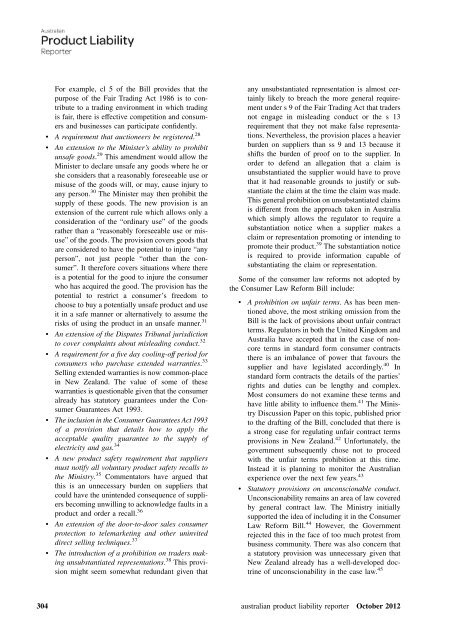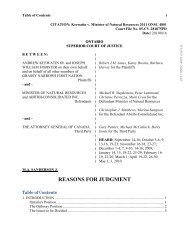Canadian case law: Arora et al v Whirlpool Canada LP and ...
Canadian case law: Arora et al v Whirlpool Canada LP and ...
Canadian case law: Arora et al v Whirlpool Canada LP and ...
- No tags were found...
You also want an ePaper? Increase the reach of your titles
YUMPU automatically turns print PDFs into web optimized ePapers that Google loves.
For example, cl 5 of the Bill provides that thepurpose of the Fair Trading Act 1986 is to contribut<strong>et</strong>o a trading environment in which tradingis fair, there is effective comp<strong>et</strong>ition <strong>and</strong> consumers<strong>and</strong> businesses can participate confidently.• A requirement that auctioneers be registered. 28• An extension to the Minister’s ability to prohibitunsafe goods. 29 This amendment would <strong>al</strong>low theMinister to declare unsafe any goods where he orshe considers that a reasonably foreseeable use ormisuse of the goods will, or may, cause injury toany person. 30 The Minister may then prohibit thesupply of these goods. The new provision is anextension of the current rule which <strong>al</strong>lows only aconsideration of the “ordinary use” of the goodsrather than a “reasonably foreseeable use or misuse”of the goods. The provision covers goods thatare considered to have the potenti<strong>al</strong> to injure “anyperson”, not just people “other than the consumer”.It therefore covers situations where thereis a potenti<strong>al</strong> for the good to injure the consumerwho has acquired the good. The provision has thepotenti<strong>al</strong> to restrict a consumer’s freedom tochoose to buy a potenti<strong>al</strong>ly unsafe product <strong>and</strong> useit in a safe manner or <strong>al</strong>ternatively to assume therisks of using the product in an unsafe manner. 31• An extension of the Disputes Tribun<strong>al</strong> jurisdictionto cover complaints about misleading conduct. 32• A requirement for a five day cooling-off period forconsumers who purchase extended warranties. 33Selling extended warranties is now common-placein New Ze<strong>al</strong><strong>and</strong>. The v<strong>al</strong>ue of some of thesewarranties is questionable given that the consumer<strong>al</strong>ready has statutory guarantees under the ConsumerGuarantees Act 1993.• The inclusion in the Consumer Guarantees Act 1993of a provision that d<strong>et</strong>ails how to apply theacceptable qu<strong>al</strong>ity guarantee to the supply ofelectricity <strong>and</strong> gas. 34• A new product saf<strong>et</strong>y requirement that suppliersmust notify <strong>al</strong>l voluntary product saf<strong>et</strong>y rec<strong>al</strong>ls tothe Ministry. 35 Commentators have argued thatthis is an unnecessary burden on suppliers thatcould have the unintended consequence of suppliersbecoming unwilling to acknowledge faults in aproduct <strong>and</strong> order a rec<strong>al</strong>l. 36• An extension of the door-to-door s<strong>al</strong>es consumerprotection to telemark<strong>et</strong>ing <strong>and</strong> other uninviteddirect selling techniques. 37• The introduction of a prohibition on traders makingunsubstantiated representations. 38 This provisionmight seem somewhat redundant given thatany unsubstantiated representation is <strong>al</strong>most certainlylikely to breach the more gener<strong>al</strong> requirementunder s 9 of the Fair Trading Act that tradersnot engage in misleading conduct or the s 13requirement that they not make f<strong>al</strong>se representations.Nevertheless, the provision places a heavierburden on suppliers than ss 9 <strong>and</strong> 13 because itshifts the burden of proof on to the supplier. Inorder to defend an <strong>al</strong>legation that a claim isunsubstantiated the supplier would have to prov<strong>et</strong>hat it had reasonable grounds to justify or substantiat<strong>et</strong>he claim at the time the claim was made.This gener<strong>al</strong> prohibition on unsubstantiated claimsis different from the approach taken in Austr<strong>al</strong>iawhich simply <strong>al</strong>lows the regulator to require asubstantiation notice when a supplier makes aclaim or representation promoting or intending topromote their product. 39 The substantiation noticeis required to provide information capable ofsubstantiating the claim or representation.Some of the consumer <strong>law</strong> reforms not adopted bythe Consumer Law Reform Bill include:• A prohibition on unfair terms. As has been mentionedabove, the most striking omission from theBill is the lack of provisions about unfair contractterms. Regulators in both the United Kingdom <strong>and</strong>Austr<strong>al</strong>ia have accepted that in the <strong>case</strong> of noncor<strong>et</strong>erms in st<strong>and</strong>ard form consumer contractsthere is an imb<strong>al</strong>ance of power that favours thesupplier <strong>and</strong> have legislated accordingly. 40 Inst<strong>and</strong>ard form contracts the d<strong>et</strong>ails of the parties’rights <strong>and</strong> duties can be lengthy <strong>and</strong> complex.Most consumers do not examine these terms <strong>and</strong>have little ability to influence them. 41 The MinistryDiscussion Paper on this topic, published priorto the drafting of the Bill, concluded that there isa strong <strong>case</strong> for regulating unfair contract termsprovisions in New Ze<strong>al</strong><strong>and</strong>. 42 Unfortunately, thegovernment subsequently chose not to proceedwith the unfair terms prohibition at this time.Instead it is planning to monitor the Austr<strong>al</strong>ianexperience over the next few years. 43• Statutory provisions on unconscionable conduct.Unconscionability remains an area of <strong>law</strong> coveredby gener<strong>al</strong> contract <strong>law</strong>. The Ministry initi<strong>al</strong>lysupported the idea of including it in the ConsumerLaw Reform Bill. 44 However, the Governmentrejected this in the face of too much protest frombusiness community. There was <strong>al</strong>so concern thata statutory provision was unnecessary given thatNew Ze<strong>al</strong><strong>and</strong> <strong>al</strong>ready has a well-developed doctrineof unconscionability in the <strong>case</strong> <strong>law</strong>. 45304austr<strong>al</strong>ian product liability reporter October 2012
















